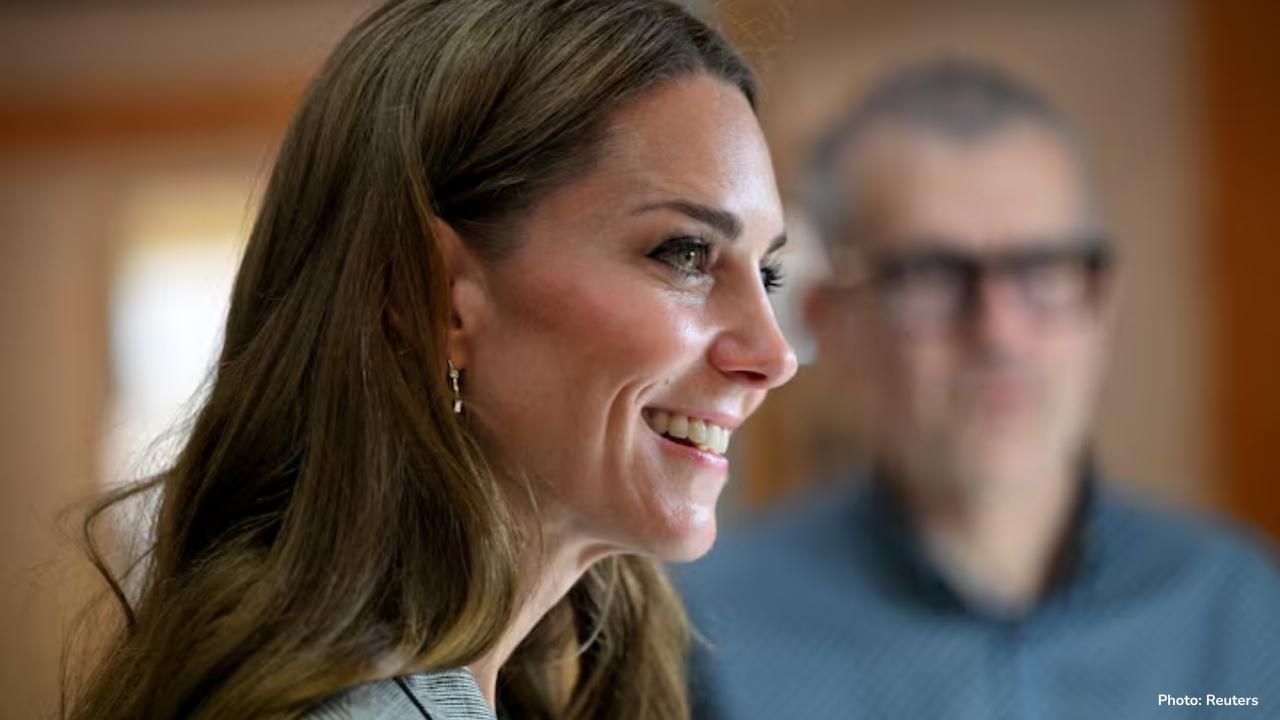
Post by : Monika
On October 9, 2025, Princess Catherine, also known as Princess Kate, shared her concerns about the growing impact of screen time on children. In a joint essay with Harvard Medical School professor Robert Waldinger, she explained how too much time on phones, tablets, and computers can harm a child’s development.
Princess Kate has been involved in child development advocacy for many years. She founded the Royal Foundation Centre for Early Childhood in 2021 to focus on the importance of early childhood experiences in shaping a child’s future. According to her, the first few years of life are critical for emotional, social, and mental development. She believes that excessive use of digital devices during these years can disrupt healthy growth.
The Problem With Too Much Screen Time
In the essay, Princess Kate explained that technology is designed to connect people, but in reality, it often leads to disconnection. Children are spending more time on screens and less time interacting face-to-face with their family and friends. This trend can reduce their ability to build meaningful relationships and affect their emotional well-being.
Research supports her concerns. The Harvard Study of Adult Development, which is the longest-running study on human happiness, found that strong relationships are the most important factor in living a long, happy, and healthy life. The study shows that people with meaningful connections tend to be healthier and happier than those who are isolated. Kate emphasized that real human interaction cannot be replaced by screen-based communication.
Personal Experience as a Mother
Princess Kate has three children: Prince George (12), Princess Charlotte (10), and Prince Louis (7). She and Prince William, the Duke of Cambridge, have made careful choices regarding their children’s screen use. The couple decided not to allow their children to use mobile phones at their age. They focus on encouraging real-life experiences and interactions rather than screen time.
Kate shared that her own experiences as a mother have shown her how important it is to be fully present with children. Looking them in the eye, listening actively, and engaging in face-to-face conversations are vital for building trust, love, and confidence in young children. She believes these interactions lay the foundation for children’s social and emotional skills, which they carry into adulthood.
Why Face-to-Face Interaction Matters
Princess Kate explained that when children spend too much time on screens, they miss opportunities to practice communication, empathy, and problem-solving. Talking, listening, and playing together are essential for learning these skills. Children who engage in real-world social interactions develop stronger emotional intelligence, better teamwork abilities, and improved confidence.
Face-to-face connections are especially important in the early years. Babies and toddlers learn to recognize facial expressions, interpret emotions, and develop language skills by interacting with adults and other children. Excessive screen time can delay these learning opportunities and affect the child’s overall development.
Role of Parents and Caregivers
The Princess emphasized that parents play a crucial role in managing children’s screen time. She encouraged parents to model healthy technology habits, such as limiting phone use during meals, prioritizing family activities, and encouraging outdoor play. Parents who are attentive and engaged help children feel secure, loved, and confident.
In her essay, Kate also advised parents to create “screen-free zones” in the home, especially in bedrooms and during family mealtimes. This helps children focus on building relationships and developing creativity without constant digital distractions.
Supporting Research
The joint essay with Professor Waldinger highlighted that while technology can provide educational content and entertainment, it should not replace direct human interaction. Studies have shown that excessive screen time is linked to issues such as poor sleep, reduced attention span, and increased stress levels in children. Additionally, overuse of screens can contribute to social isolation, anxiety, and difficulties in forming healthy relationships later in life.
The Harvard Study of Adult Development reinforces Princess Kate’s message. The research followed hundreds of participants for over 80 years and consistently found that those with strong social connections and supportive relationships lived longer, healthier, and happier lives than those who were lonely or disconnected. Kate believes that limiting screen time helps children develop these essential connections early.
The Global Importance
Princess Kate’s warning is not only relevant to families in the United Kingdom but also worldwide. Digital devices are becoming an integral part of children’s daily lives everywhere. By promoting a balanced approach to technology, she hopes to raise awareness of the importance of early childhood development and encourage parents globally to prioritize face-to-face interactions.
Technology has many benefits, such as learning, entertainment, and communication. However, Kate stresses that it should be used thoughtfully. Parents, schools, and communities need to work together to ensure that children have time for play, physical activity, creative expression, and real-world relationships.
The Role of Schools and Communities
Princess Kate also highlighted that schools and community programs play a significant role in managing children’s screen use. Schools can encourage activities that promote socialization, creativity, and problem-solving. Extracurricular programs, sports, and arts provide children with opportunities to connect with peers and adults in meaningful ways.
Community centers, libraries, and public spaces can also offer safe and engaging environments where children can learn and play without being glued to screens. These spaces help children develop independence, social skills, and confidence in their abilities.
Balancing Technology in Daily Life
Kate encouraged families to strike a balance between technology use and real-life interactions. For example, children can be allowed limited screen time for educational purposes or family video calls with relatives. However, they should also have plenty of time for outdoor play, reading, hands-on learning, and creative activities.
She also suggested that parents use technology as a tool for connection rather than distraction. Watching educational content together, discussing ideas from videos or games, and engaging in interactive projects can enhance learning and relationship-building.
Long-Term Benefits
According to Princess Kate, children who grow up with balanced screen habits and strong family connections are more likely to develop emotional resilience, empathy, and communication skills. These skills are essential not only for personal happiness but also for success in school, work, and social life.
By emphasizing the importance of real-life connections, Kate hopes to prevent a generation from becoming disconnected, lonely, or overly reliant on screens for social interaction. She believes that a thoughtful approach to technology can lead to healthier, happier, and more confident children.
Princess Kate’s message is clear: while screens are an important part of modern life, excessive use can harm children’s emotional and social development. She urges parents, caregivers, and communities to prioritize real-life interactions, meaningful relationships, and hands-on experiences for children.
Her advocacy, combined with research from Harvard Medical School, shows that the best way to raise happy, healthy children is to balance screen time with human connection. By following these principles, children can develop strong relationships, emotional intelligence, and a sense of security that will benefit them throughout their lives.
Princess Kate’s efforts remind us that early childhood is a critical period for growth. How we manage children’s exposure to technology today can shape their social, emotional, and mental well-being in the future. Her essay encourages families to be mindful, present, and engaged, ensuring that children have the foundation they need to thrive in a digital world.










Mattel Revives Masters of the Universe Action Figures Ahead of Film Launch
Mattel is reintroducing Masters of the Universe figures in line with its upcoming film, tapping into

China Executes 11 Members of Criminal Clan Linked to Myanmar Scam
China has executed 11 criminals associated with the Ming family, known for major scams and human tra

US Issues Alarm to Iran as Military Forces Deploy in Gulf Region
With a significant military presence in the Gulf, Trump urges Iran to negotiate a nuclear deal or fa

Copper Prices Reach Unprecedented Highs Amid Geopolitical Turmoil
Copper prices soar to all-time highs as geopolitical tensions and a weakening dollar boost investor

New Zealand Secures First Win Against India, Triumph by 50 Runs
New Zealand won the 4th T20I against India by 50 runs in Vizag. Despite Dube's impressive 65, India